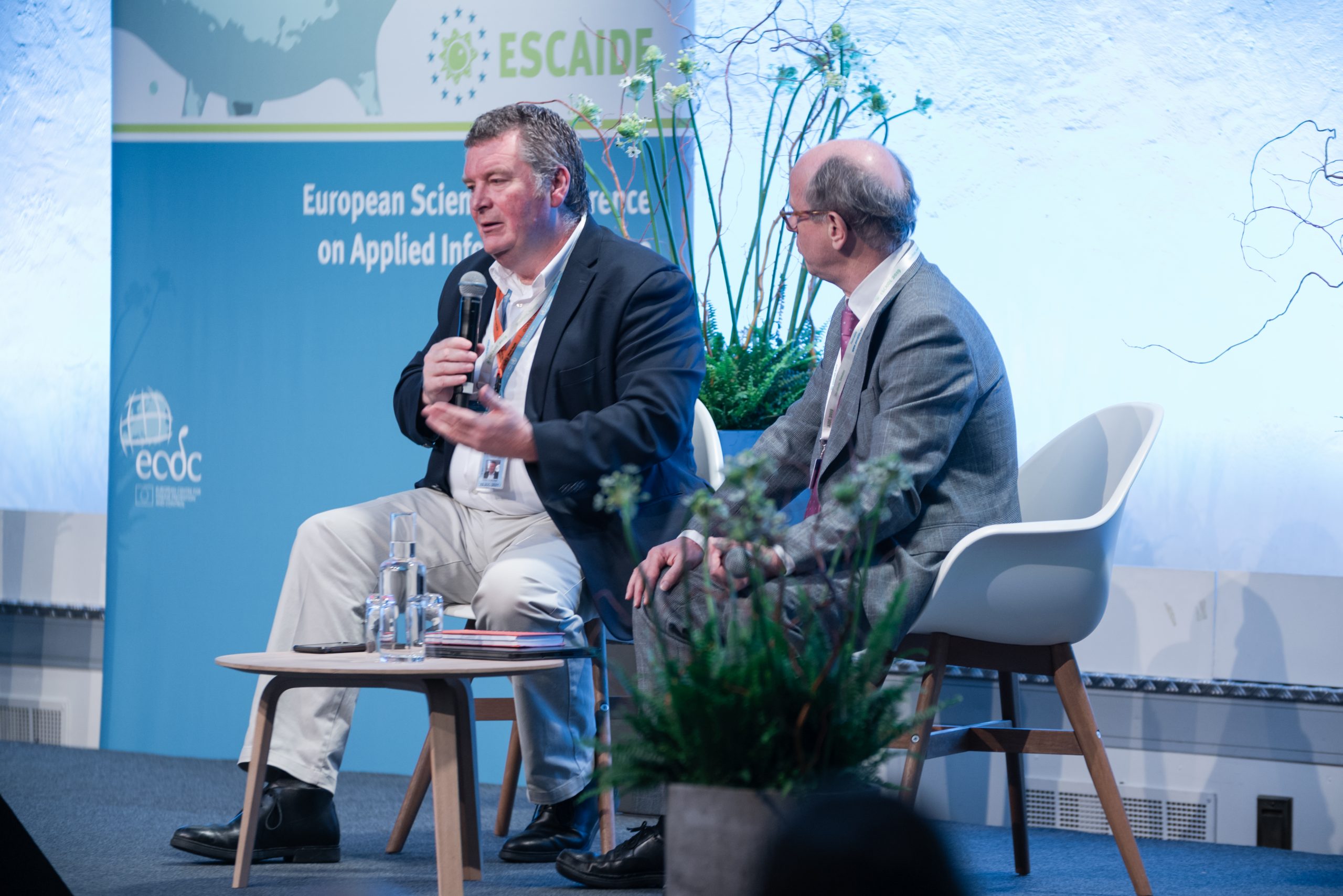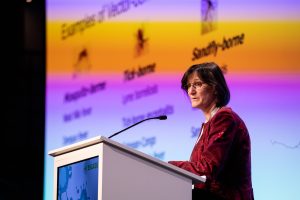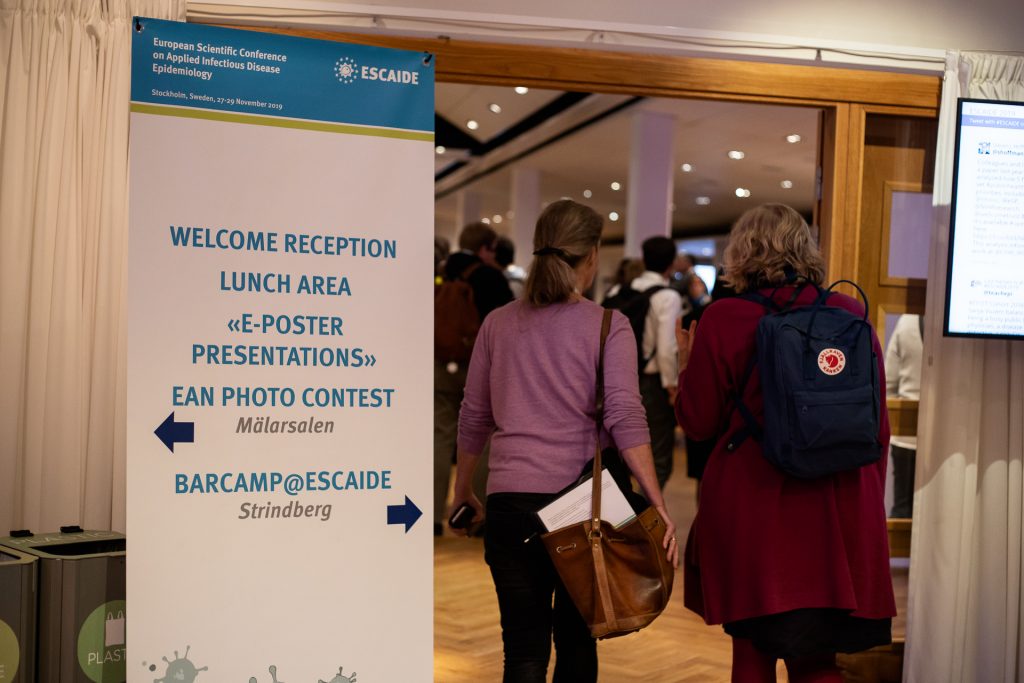Viral Pneumonia: Practice Essentials, Background, Pathophysiology


(The title is an homage to the host country of the conference – Sweden – where the smörgåsbord is a buffet-style meal served on a large table. In English, the term has also adopted a more general meaning describing a variety of items on offer, such as a conference with a wide choice of interesting sessions!)
In November 2019, PLOS ONE staff editor Artur Arikainen attended the European Scientific Conference on Applied Infectious Disease Epidemiology (ESCAIDE), held this year in the home of the European Centre for Disease Prevention and Control (ECDC) – Stockholm, Sweden. The conference brought together over 600 attendees from 46 countries, including 20 non-EU countries. As with ESCAIDE 2018, the themes of the scientific sessions were varied and engaging – ranging from emerging diseases, to healthcare-associated infections, to food- and water-borne diseases.

On the topic of health security and preparedness, Dr. Mike Ryan (WHO Health Emergencies Program) provided an insightful update on the ongoing Ebola outbreak in DR Congo, where local conflict and community frustrations present increased challenges to stopping the spread of this deadly disease. The WHO has been responding to 30,000 Ebola infection alerts each week, and have traced an impressive 235,000 contacts so far (which required 5,000,000 total patient visits). Given the >170 current infectious disease outbreaks occurring worldwide (of which Ebola is merely one), Dr. Ryan highlighted that preparedness capacity still needs to be developed and maintained for possible future high-impact, large-scale epidemics; deadly global pandemics; and/or cases of deliberate or accidental bioterror agent release.
A number of agencies and organisations that conduct field operations like those in DR Congo have a strong presence at ESCAIDE every year. The ECDC themselves run two training programmes in field epidemiology (EPIET) and public health epidemiology (EUPHEM), with many current and past fellows attending ESCAIDE, including the EPIET alumni network (EAN). Other organisations well represented at ESCAIDE include the Training Programs in Epidemiology and Public Health Interventions Network (TEPHINET) and the Global Outbreak Alert and Response Network (GOARN).
During the conference, delegates were invited to participate in a live, on-screen vote via the conference app on what they thought the key priorities for epidemiologists should be for the near future. On a national level, antimicrobial resistance (AMR) was deemed most important, followed by climate change. From a global perspective, climate change ranked highest, followed by AMR. Other issues like outbreaks, vaccines, microbiomes, and non-communicable diseases scored somewhat lower, highlighting the pressing desire in the epidemiology community to address AMR and climate change problems first. We at PLOS recognise the importance of these topics to human health and well-being, and have launched several Calls for Papers on related topics, including AMR, Urban Ecosystems, and Microbial Ecology of Changing Environments. Of note, the AMR Collection publishing today was inspired by the discussions at ESCAIDE 2018.
On the impact of climate change on human disease epidemiology, Dr. Henriette De Valk and Prof. Ana Maria de Roda Husman presented informative and sobering overviews on changes in vector-borne, water-borne, and other diseases that have been observed and can be expected to occur in the future. Warming temperatures in Europe create opportunities for mosquitos and other disease vectors to spread further North, reaching new human populations, as has been the case with West Nile virus. The conclusion drawn from their talks is that time is running out and action is needed now to stop things becoming much worse later down the line.



The important issue of vaccination was also covered in a plenary session and in multiple parallel sessions. Prof. Wolfgang Gaissmaier (University of Konstanz) and Dr. Robb Butler (WHO Europe) presented an overview of human behaviour and decision-making that gives rise to vaccination hesitancy in some countries. This is particularly pertinent with the backdrop of multiple current outbreaks of measles around the world – a disease that had practically been eradicated in the developed world until these recent resurgences. Recommendations presented include communicating benefits/harms more understandably, complementing evidence with human stories, understanding reasons for hesitancy and targeting concerned patients, setting positive messages (without repeating myths), lowering barriers to vaccination access, and highlighting social benefits (e.g. herd immunity).
An interesting session held during ESCAIDE is BarCamp, which is run as an informal discussion forum. Any delegate can propose a topic by writing it on a board, and everyone else votes on their favourite topics by adding votes to the board. Topics usually venture further than the standard scientific programme and provide delegates the opportunity to hear about something 'a bit different'.
This year, our attending editor proposed the topic "What is the future of science publishing?", which was voted to be discussed. After a brief introduction with some suggested talking points (including preprints, registered reports, and the cult of the journal impact factor in research assessment), delegates enthusiastically gave their views on how they felt their research needed to be best communicated, and what barriers stood in their way.

A popular discussion point proved to be transparency in the peer review process. Participants largely felt that publishing reviewer comments would help rather than hinder the process, providing that reviewers could maintain their anonymity. This was also an opportunity to mention the exciting new collaboration between PLOS and other non-profit publishers on a system of portable, journal-agnostic peer review – Review Commons. Other points included the need for post-publication review, and the sharing of code and data underlying studies (particularly for large epidemiological datasets!).
Overall, ESCAIDE presents a productive and interesting programme, and gives good insight into the important work being done in Europe and the wider world to combat infectious diseases. Next year's ESCAIDE will be held in Warsaw, Poland in November 2020.
Comments
Post a Comment